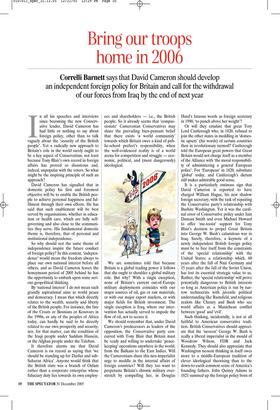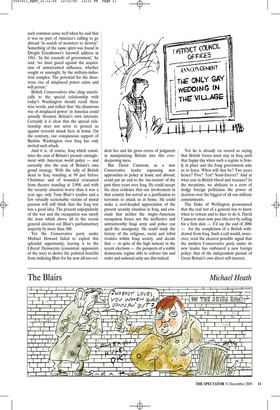Bring our troops home in 2006
Correlli Barnett says that David Cameron should develop an independent foreign policy for Britain and call for the withdrawal of our forces from Iraq by the end of next year In all his speeches and interviews since becoming the new Conservative leader, David Cameron has had little or nothing to say about foreign policy, other than to talk vaguely about the ‘security of the British people’. Yet a radically new approach to Britain’s role in the world surely ought to be a key aspect of Conservatism, not least because Tony Blair’s own record in foreign affairs has proved so disastrous and, indeed, unpopular with the voters. So what might be the inspiring principle of such an approach?
David Cameron has signalled that in domestic policy his first and foremost objective will be to enable the British people to achieve personal happiness and fulfilment through their own efforts. He has said that such enablement will be best served by organisations, whether in education or health care, which are fully selfgoverning and also close to the communities they serve. His fundamental domestic theme is, therefore, that of personal and institutional independence.
So why should not the same theme of independence inspire the future conduct of foreign policy? In this context, ‘independence’ would mean the freedom always to place our own national interest before all others, and as David Cameron leaves the honeymoon period of 2005 behind he has the opportunity to embark upon some serious geopolitical thinking.
By ‘national interest’ I do not mean such grandly aspirational aims as world peace and democracy. I mean that which directly relates to the wealth, security and liberty of the British people. For instance, the fate of the Croats or Bosnians or Kosovars in the 1990s, or any of the peoples of Africa today, can hardly be said to be directly related to our own prosperity and security; nor, for that matter, can the condition of the Iraqi people under Saddam Hussein, or the Afghan people under the Taleban.
It therefore alarms me that David Cameron is on record as saying that ‘we should be standing up for Darfur and subSaharan Africa’. Anyone would think that the British state was a branch of Oxfam rather than a corporate enterprise whose fiduciary duty lies towards its own employ ees and shareholders — i.e., the British people. So it already seems that ‘compassionate’ Cameronian Conservatives may share the prevailing bien-pensant belief that there exists ‘a world community’ towards which Britain owes a kind of public-school prefect’s responsibility, when the well-evidenced reality is of a world arena for competition and struggle — economic, political, and (most dangerously) ideological.
We are sometimes told that because Britain is a global trading power it follows that she ought to shoulder a global military role. But why? With a single exception, none of Britain’s current out-of-Europe military deployments coincides with our major sources of oil, gas or raw materials, or with our major export markets, or with major fields for British investment. The single exception is Iraq, where our intervention has actually served to impede the flow of oil, not to secure it.
We should remember that, under David Cameron’s predecessors as leaders of the opposition, the Conservative party concurred with Tony Blair that Britain must be ready and willing to undertake ‘peacekeeping’ operations anywhere in the world, from the Balkans to the East Indies. Will the Cameronians share this neo-imperialist urge to meddle in the internal affairs of foreign countries? Will they too want to perpetuate Britain’s chronic military overstretch by compelling her, in Douglas Hurd’s fatuous words as foreign secretary in 1990, ‘to punch above her weight’?
Or will they emulate that great Tory Lord Castlereagh who, in 1820, refused to join the other states in meddling in ‘domestic upsets’ (his words) of certain countries then in revolutionary turmoil? Castlereagh told the European great powers that Great Britain would not charge itself as a member of the Alliance with ‘the moral responsibility of administering a general European police’. For ‘European’ in 1820, substitute ‘global’ today, and Castlereagh’s dictum still makes admirable good sense.
It is a particularly ominous sign that David Cameron is reported to have charged William Hague, his new shadow foreign secretary, with the task of repairing the Conservative party’s relationship with Bushite Washington. Yet it was the cardinal error of Conservative policy under Iain Duncan Smith and even Michael Howard to offer ‘me-tooist’ support for Tony Blair’s decision to propel Great Britain into George W. Bush’s calamitous war in Iraq. Surely, therefore, a keynote of a newly independent British foreign policy must be to free itself from the constraints of the ‘special relationship’ with the United States; a relationship which, 60 years after the fall of Nazi Germany and 15 years after the fall of the Soviet Union, has lost its essential strategic value to us. Rather, the ‘special relationship’ will prove potentially dangerous to British interests so long as American policy is run by narrow technocrats with juvenile political understanding like Rumsfeld, and religious zealots like Cheney and Bush who see world affairs as a Manichean conflict between ‘good’ and ‘evil’.
Such thinking, incidentally, is not at all faithful to American conservative tradition. British Conservatives should appreciate that the ‘neocon’ George W. Bush is really a liberal imperialist in the mould of Woodrow Wilson, FDR and Jack Kennedy. They should also appreciate that Washington neocon thinking in itself owes more to a middle-European tradition of clever ideological theorising than to the down-to-earth common sense of America’s founding fathers. John Quincy Adams in 1821 summed up the foreign policy born of such common sense well when he said that it was no part of America’s calling to go abroad ‘in search of monsters to destroy’. Something of the same spirit was found in Dwight Eisenhower’s farewell address in 1961. ‘In the councils of government,’ he said, ‘we must guard against the acquisition of unwarranted influence, whether sought or unsought, by the military-industrial complex. The potential for the disastrous rise of misplaced power exists and will persist.’ British Conservatives who cling uncritically to the special relationship with today’s Washington should recall these wise words, and reflect that ‘the disastrous rise of misplaced power’ in America could actually threaten Britain’s own interests. Certainly it is clear that the special relationship does not serve to protect us against terrorist attack here at home. On the contrary, our conspicuous support of Bushite Washington over Iraq has only invited such attack.
And it is, of course, Iraq which constitutes the crux of Britain’s present entanglement with American world policy — and currently also the crux of Britain’s own grand strategy. With the tally of British dead in Iraq standing at 98 just before Christmas and of wounded evacuated from theatre standing at 3,908, and with the security situation worse than it was a year ago, only Tony Blair’s toadies and a few virtually sectionable victims of moral passion will still think that the Iraq war was a good idea. The present unpopularity of the war and the occupation was surely the issue which above all in the recent general election cut Blair’s parliamentary majority by more than 100.
Yet the Conservative party under Michael Howard failed to exploit this splendid opportunity, leaving it to the Liberal Democrats (consistent opponents of the war) to derive the political benefits from indicting Blair for his now all-too-evi dent lies and his gross errors of judgment in manipulating Britain into this everdeepening mess.
But David Cameron, as a new Conservative leader espousing new approaches to policy at home and abroad, could put an end to the ‘me-tooism’ of the past three years over Iraq. He could accept the clear evidence that our involvement in that country has served as a justification to terrorists to attack us at home. He could make a cool-headed appreciation of the present security situation in Iraq, and conclude that neither the Anglo–American occupation forces nor the ineffective and untrustworthy Iraqi army and police can quell the insurgency. He could study the history of the religious, racial and tribal rivalries within Iraqi society, and decide that — in spite of the high turnout in the recent elections — the prospects of a stable democratic regime able to enforce law and order and national unity are dim indeed. Yet he is already on record as saying that British forces must stay in Iraq until that happy day when such a regime is firmly in place and the Iraqi government asks us to leave. When will that be? Two years hence? Five? Ten? Semi-forever? And at what cost in British blood and treasure? In the meantime, we abdicate to a crew of dodgy foreign politicians the power of decision over the biggest of all our military commitments.
The Duke of Wellington pronounced that the real test of a general was to know when to retreat and to dare to do it. David Cameron must now pass this test by calling for a firm date — I’d say the end of 2006 — for the completion of a British withdrawal from Iraq. Such a call would, moreover, send the clearest possible signal that the modern Conservative party under its new leader has embraced a new foreign policy: that of the independent pursuit of Great Britain’s own direct self-interest.


















































 Previous page
Previous page